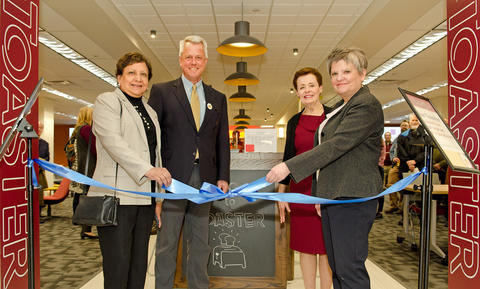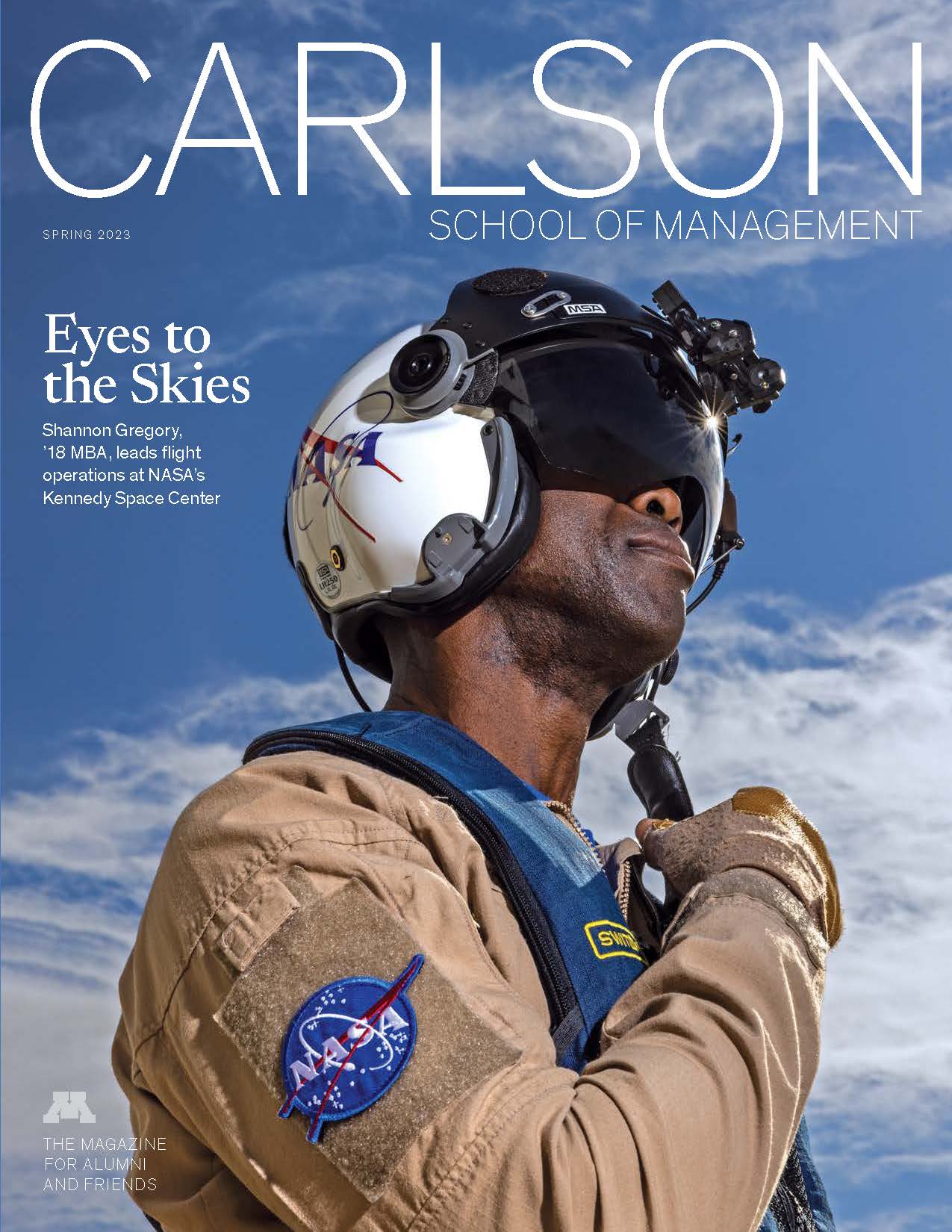
How Alum John Stavig Transformed the Holmes Center
Friday, April 21, 2023
By Adam Overland
John Stavig wasn’t looking for work.
But the business journal ad looking for someone to lead and expand entrepreneurship offerings at the Carlson School of Management was intriguing.
He had experience, after all. In just a 15-year career, Stavig had invested in, and led, multiple startups—from a communications network construction firm to what would eventually become apartments.com. In 2000, Verizon paid more than $300 million to acquire OnePoint Communications, a business he helped build, which was an early pioneer of the then-revolutionary Voice over Internet Protocol (VoIP) technology.
At 38, he retired and moved to Minnesota with his wife to start a family.
It wasn’t unfamiliar territory. Stavig graduated from the University of Minnesota School of Business in 1986 (followed by an MBA at The Wharton School in Philadelphia). He spent time building his family and spending as much time with them as possible, which was fulfilling. “But I got restless pretty quick, and none of my friends were retired, so there was nobody else to really play with.”
So he responded to the ad. He chatted with Roy Wetterstrom and confirmed his hunch: It would be fun to come back to the University for a couple of years and try something different. “Eighteen years later, I’m still here,” he says.
Taking Entrepreneurship to the Next Level
Wetterstrom, ’86 BSB, founder of Revo Brands, was leading what was then known as the Carlson School’s Center for Entrepreneurial Studies. He knew firsthand what someone like Stavig could do full time.
In the 18 years since, Stavig has been the director of the Carlson School’s Holmes Center for Entrepreneurship—named after a 2007 gift from real estate developer Gary Holmes—which offers numerous courses for students, but also programming open to any entrepreneurial Minnesotan (see sidebar), mentorship opportunities, startup internships, and more. The center is self-sustaining, with more than $25 million in gifts from alums, businesses, and others.
“It’s incredible to see what John has been able to do in terms of really bringing our entrepreneurship program to an entirely new level,” says Wetterstrom. “He’s turned the Holmes Center into a phenomenal organization that is supporting entrepreneurship throughout the University and all over Minnesota.”
What Breaks and What Works: Experiential Learning
The Entrepreneurship in Action course launched in 2005. Stavig has co-taught it with Wetterstrom ever since.
Undergraduates enrolled in the two-semester experiential course form small teams that launch and operate a real business, receiving up to $15,000. Since its inception, the course has helped launch more than 60 companies.
“The most valuable learning students get is how to motivate other people and how to pull them out of the periods when either the team is fighting, or the vendors have let them down, and they’ve got to find a way to move forward,” explains Stavig. “Every startup is like that.”
David O’Neill and Jason Dayton, both ’15 BSB, co-founders of Minneapolis Cider Company, have come a long way since taking the course almost a decade ago.
“What was unique about the course, especially in a college setting, is it’s not a textbook,” says O’Neill, recalling funding and distribution challenges early on. “You see what breaks. You see what works.”
“Occasionally [students] hit some bumps,” agrees Stavig, “but that’s where the real learning happens.”
“John’s very Socratic,” adds O’Neill. “Sometimes you’d go to him with a problem, and you just know that he knows what he would do, but he would never just tell you the answer. He would just ask you questions, and he’d let you come to your own conclusions.”
“Seeing students grow through [the course] and seeing them realize what they’re capable of is really cool,” says Stavig. “In my view, there’s nothing else like that.”
For O’Neill, the course was life-changing.
“Today I’ve got a multimillion-dollar business that I run. I employ over 30 people. My wife works with me. So John has been an absolutely transformational influence in my business and life.”
A Platform for Startups
Another signature program that Stavig helped grow is the Minnesota Cup (MN Cup).
Founded in 2005 by University alumni Scott Litman and Dan Mallin, MN Cup is the country’s largest statewide startup competition.
Under the stewardship of Stavig and his team, the competition has grown from two to nine divisions, with more than 250 volunteer mentors and judges. More than 20,000 Minnesota entrepreneurs, including UMN students and faculty, have participated over the years—many of them receiving a share of more than $5 million in
non-dilutive cash prizes. Participants also receive critical mentoring. These companies, in turn, have gone on to raise more than $1 billion.
Morgan Kerfeld, ’21 BSB, was recently a MN Cup entrepreneur. She co-founded Telo—a startup based on the first significant design change to the rollator walker in decades—with three other students through the Entrepreneurship in Action course. In MN Cup 2021, Telo took second place in the student division, and after winning two additional awards, received $36,000 in startup funding.
After graduating in 2021, Kerfeld took a year to focus on Telo and plan her next steps.
“Even though we had all graduated, he continued to be an advocate for Telo and was always willing to take a phone call,” Kerfeld says of Stavig. “He would even review our applications to other competitions that weren’t MN Cup. It blows my mind still today that he was willing to do all of this. Without him, Telo never would have happened.”
Telo has continued to evolve its products and business plan. In MN Cup 2022, they won the general division and took home $25,000.
Stavig’s dedication so inspired Kerfield that a year after graduating, she decided to enroll in the Carlson School’s MBA program, joining Stavig as his graduate teaching assistant.
The Key to His Success
“The greatest phone calls or emails that I get are when students who’ve gone through classes like Entrepreneurship in Action, or through MN Cup, reach out five or 10 years after graduating and say, ‘I’m starting my own company, but I don’t feel like this is my first rodeo,’” Stavig says.
Starting a successful business takes more than a great idea, and it’s never the work of one person, but a network that supports you when inevitable challenges arise. Stavig has played an integral role in creating this environment at the University of Minnesota.
“I think it’s not often in life that somebody gets an opportunity to do something that is really consequential, and he’s doing that right now,” Wetterstrom says. “The things he is doing are having a huge impact on the University’s ability to develop students and entrepreneurs, and are fostering entrepreneurship across the University. That legacy is something that is going to last a long time.”
For his part, Stavig is reluctant to claim much credit, and points to the people around him as being the key to his and the Holmes Center’s success.
“I’ve been very fortunate to work alongside some incredible people throughout my career. If I had any theme across both my experiences with building companies or with the Holmes Center, I think it’s about getting a small number of great people together, giving them the resources they need, and getting out of the way.”

